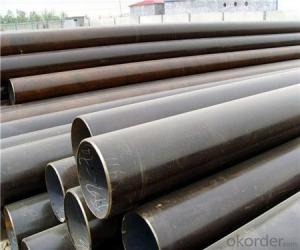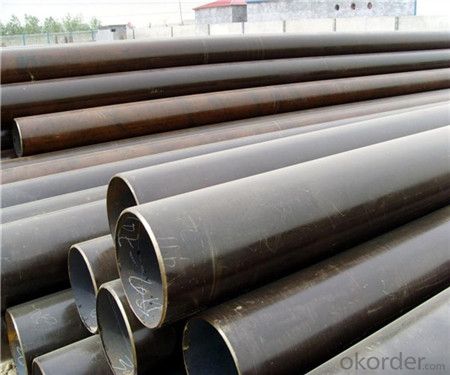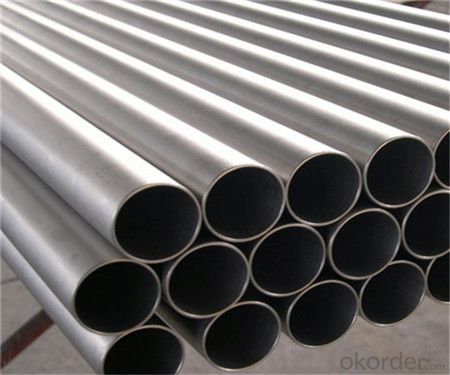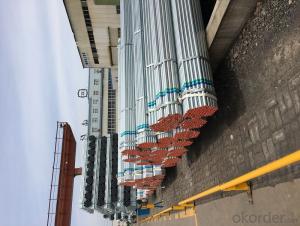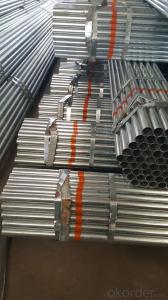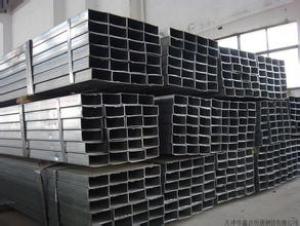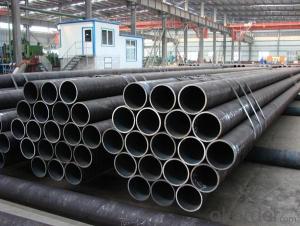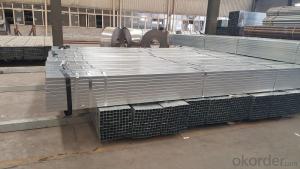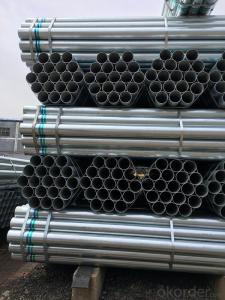Welde Pipe/Tube hot dipped Galvanized Pipe supplier
- Loading Port:
- Tianjin
- Payment Terms:
- TT OR LC
- Min Order Qty:
- 20 m.t.
- Supply Capability:
- 12000 m.t./month
OKorder Service Pledge
OKorder Financial Service
You Might Also Like
Product Description:
HOT DIPPED GALVANIZED PIPE
Standard: ASTM A53, BS1387, GB3091
● Application: To be used for conveying gas, water and
structural purpose
● Main Steel Tube Grade: A, B. Q195, Q215, Q235
2、Main Features of the Seamless Pipe :
• High manufacturing accuracy
• The higher strength
• The small inertia resistance
• Strong heat dissipation ability
• Good visual effect
• Satisfy price
3、Seamless Pipe ASTM DIN1829 Specification:
Standard | GB, DIN, ASTM ASTM A106-2006, ASTM A53-2007 |
Grade | 10#-45#, 16Mn 10#, 20#, 45#, 16Mn |
Thickness | 8 - 33 mm |
Section Shape | Round |
Outer Diameter | 133 - 219 mm |
Place of Origin | Shandong, China (Mainland) |
Secondary Or Not | Non-secondary |
Application | Hydraulic Pipe |
Technique | Cold Drawn |
Certification | API |
Surface Treatment | factory state or painted black |
Special Pipe | API Pipe |
Alloy Or Not | Non-alloy |
Length | 5-12M |
Outer Diameter | 21.3-610mm |
Grade | 20#, 45#, Q345, API J55, API K55, API L80, API N80, API P110, A53B |
Standard | ASME, ASTM |
1) Material:20#(ASTM A 106/A53 GRB.API5LGRB,GB),45#,16Mn,10#.
2) Specification range:OD:21.3-610mm,WT:6-70mm,length:6-12m or according to the requirement of clients.
3) Excutive standards:GB,ASME API5L.ASTM A 106/A53,Despite of the above standards,we can also supply seamless steel pipe with standard of DIN,JIS,and so on,and also develop new products according to the requirements of our clients!
4) Surface:black lacquered,varnish coating or galvanized.
5) Ends:Beveled or square cut,plastic capped,painted.
6) Packing:bundles wrapped with strong steel strip,seaworthy packing.
4、Packaging & Delivery
Packaging Details: | seaworthy package,bundles wrapped with strong steel strip |
Delivery Detail: | 15-30days after received 30%TT |
5、FAQ of Seamless Pipe ASTM DIN1829:
①How is the quality of your products?
We have many years business experience in this area, and we have professional engineer and manager team and sure we can provide you high quality production and professional service.
②How about price?
Yes, we are factory and be able to give you lowest price below market one, and we have a policy that “ for saving time and absolutely honest business attitude, we quote as lowest as possible for any customer, and discount can be given according to quantity”,if you like bargain and factory price is not low enough as you think, just don’t waste your time.Please trust the quotation we would give you, it is professional one.
③Why should you chose us?
We can give you both.Additionally, we can also offer professional products inquiry, products knowledge train(for agents), smooth goods delivery, exellent customer solution proposals.Our service formula: good quality+good price+good service=customer’s trust
SGS test is available, customer inspection before shipping is welcome, third party inspection is no problem.
6、Seamless Pipe ASTM DIN1829 Images:
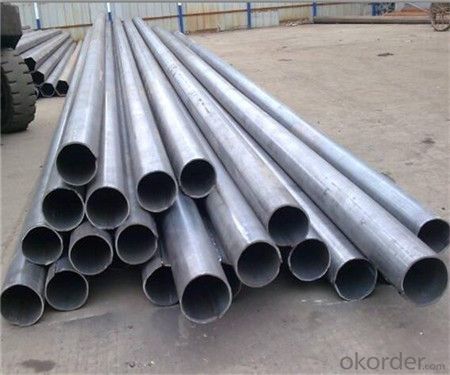
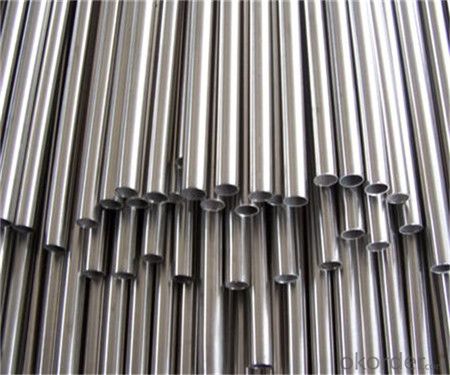
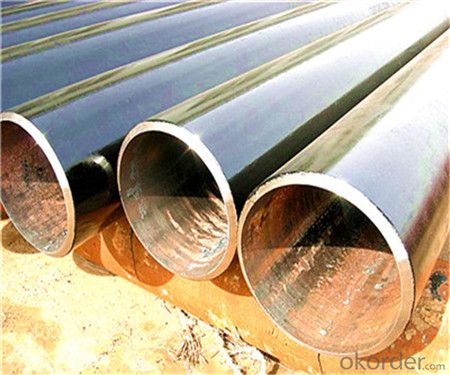
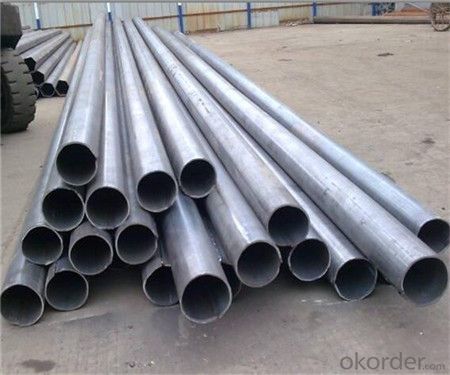
- Q: What is the role of steel pipes in the mining and extraction of minerals?
- The mining and extraction of minerals heavily rely on steel pipes, which have a vital role to play. These pipes are extensively utilized in diverse mining operations for the transportation of fluids like water and slurry. Moreover, they are employed to offer structural reinforcement and ventilation within underground mines. A fundamental application of steel pipes in mining is the transportation of water and slurry. Water is an essential component in the mining process, serving purposes such as dust suppression, ore processing, and site rehabilitation. The creation of a pipeline network using steel pipes enables the efficient transfer of water from its source, such as a reservoir or dam, to various areas within the mine. Similarly, slurry, a mixture of crushed minerals and water, is frequently conveyed through steel pipes to processing plants or tailings dams. Structural support is another critical function fulfilled by steel pipes in underground mines. The extraction of valuable mineral deposits necessitates the construction of tunnels and shafts. To endure the immense pressure exerted by the surrounding rock and prevent collapses, these underground excavations require reinforcement. Steel pipes, acting as support structures like roof bolts and rock bolts, strengthen the walls and roofs of these tunnels and shafts, thereby ensuring miner safety and maintaining the stability of the mine structure. Furthermore, steel pipes are employed in ventilation systems within underground mines. Proper ventilation is vital for mining operations, ensuring a continuous supply of fresh air, removal of harmful gases, and control of temperature and humidity levels. Steel pipes are utilized to create ventilation shafts and ducts, facilitating the smooth flow of air throughout the mine. This aids in preventing the accumulation of toxic gases, dust, and excessive heat, thereby maintaining a safe and healthy working environment for miners. To summarize, steel pipes are indispensable for the mining and extraction of minerals. They facilitate the transportation of fluids, offer structural reinforcement in underground mines, and contribute to efficient ventilation systems. The absence of steel pipes would significantly impede the efficient and safe extraction of minerals from mines.
- Q: What does "HBB" glass steel pipe mean?
- The utility model has the advantages of high strength, light weight, no deformation, smoothness of the inner surface, etc.. The friction coefficient is small, the cable is light and smooth, and the cable is not damaged. The weight is only 1/4 of the steel tube, and the 1/10 of the concrete pipe can be moved by one person. The transportation is convenient and the construction is simple and convenient.
- Q: How are steel pipes insulated to prevent freezing?
- Steel pipes are typically insulated using materials such as foam or fiberglass insulation, which are wrapped around the pipes. This insulation helps to prevent freezing by providing a barrier between the cold temperatures outside and the pipes, thus maintaining the necessary heat inside the pipes to prevent freezing.
- Q: How are steel pipes used in the water supply system?
- Steel pipes are commonly used in the water supply system due to their durability and strength. They are used to transport water from the source, such as a reservoir or water treatment plant, to various distribution points, such as homes, buildings, and industries. Steel pipes are resistant to corrosion and can handle high water pressure, making them ideal for long-distance water transportation. Additionally, steel pipes are often used in underground applications, as they can withstand the weight of soil and other external forces.
- Q: How do you calculate the pipe flow rate for steel pipes?
- To calculate the pipe flow rate for steel pipes, you can use the Hazen-Williams equation or the Darcy-Weisbach equation. These equations take into consideration factors such as the pipe diameter, length, roughness, and the pressure difference between the two ends of the pipe. By plugging in these values into the respective equation, you can determine the flow rate of the fluid passing through the steel pipe.
- Q: How are steel pipes used in the construction of underground parking garages?
- Steel pipes are used in the construction of underground parking garages for various purposes, including providing structural support, serving as conduits for utilities such as water and electricity, and facilitating drainage systems. They are often used as deep foundation elements to support the weight of the structure and the vehicles above. Additionally, steel pipes are commonly used for installing fire suppression systems, ventilation systems, and plumbing connections within the parking garage.
- Q: How seamless steel tube is formed?
- Seamless steel tubes are formed by cold drawing and hot rolling.
- Q: What are the different types of expansion joints used with steel pipes?
- There are several types of expansion joints commonly used with steel pipes, including bellows expansion joints, slip expansion joints, and flanged expansion joints. Bellows expansion joints are flexible connectors made of a series of convolutions that allow for axial, lateral, and angular movement. Slip expansion joints consist of two pipe sections with a sliding sleeve in between, allowing for limited axial movement. Flanged expansion joints are designed with flanged ends to provide flexibility and accommodate movement in all directions. These various types of expansion joints are used to absorb thermal expansion, vibration, and misalignment in steel pipe systems.
- Q: How do you calculate the pipe thermal expansion coefficient for steel pipes?
- In order to calculate the pipe thermal expansion coefficient for steel pipes, it is necessary to take into account both the linear expansion coefficient of the material and the temperature change. The typical linear expansion coefficient for steel is approximately 12 x 10^-6 per degree Celsius. To begin with, establish the initial length of the pipe, which is represented by L0. Then, measure the temperature change, indicated as ΔT. Proceed by multiplying the initial length of the pipe by the linear expansion coefficient and the temperature change: ΔL = L0 * α * ΔT. The resulting value, ΔL, signifies the alteration in length of the steel pipe caused by thermal expansion.
- Q: What is the difference between steel pipe and PVC conduit?
- Steel pipe and PVC conduit are both used for different purposes and have different characteristics. One of the main differences between steel pipe and PVC conduit is their material composition. Steel pipe is made of a sturdy and durable material, typically carbon steel or stainless steel. This makes it strong and resistant to impact, making it suitable for heavy-duty applications such as plumbing or structural support. On the other hand, PVC conduit is made of polyvinyl chloride, a type of plastic. PVC is lightweight, flexible, and easy to work with, making it ideal for electrical applications such as protecting and routing electrical wires. Another difference is their resistance to corrosion. Steel pipe is more resistant to corrosion than PVC conduit, especially when coated with protective layers such as zinc or epoxy. This makes steel pipe suitable for outdoor applications, underground installations, or environments with high moisture or corrosive elements. PVC conduit, while generally resistant to moisture and chemicals, may deteriorate over time when exposed to sunlight and can be damaged by certain chemicals. Cost is another factor to consider. Steel pipe is generally more expensive than PVC conduit due to its material and manufacturing process. However, steel pipe's durability and long lifespan make it a cost-effective choice in the long run, especially for applications that require high strength and longevity. PVC conduit, on the other hand, is relatively inexpensive and readily available, making it a more affordable option for many electrical projects. Lastly, installation methods differ between the two. Steel pipe is typically joined together using threaded connections or welded joints, requiring specialized tools and skills. PVC conduit, on the other hand, can be easily cut, assembled, and connected using PVC cement or fittings. This makes PVC conduit a more DIY-friendly option for electrical installations. In summary, the main differences between steel pipe and PVC conduit lie in their material composition, resistance to corrosion, cost, and installation methods. Steel pipe is strong, durable, and corrosion-resistant, making it suitable for heavy-duty applications. PVC conduit, on the other hand, is lightweight, flexible, and affordable, making it ideal for electrical projects.
Send your message to us
Welde Pipe/Tube hot dipped Galvanized Pipe supplier
- Loading Port:
- Tianjin
- Payment Terms:
- TT OR LC
- Min Order Qty:
- 20 m.t.
- Supply Capability:
- 12000 m.t./month
OKorder Service Pledge
OKorder Financial Service
Similar products
Hot products
Hot Searches
Related keywords
